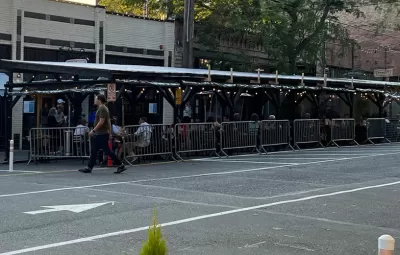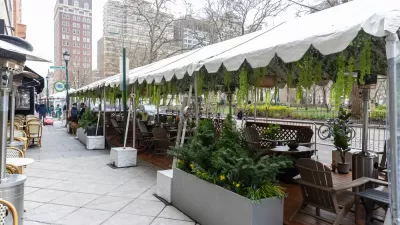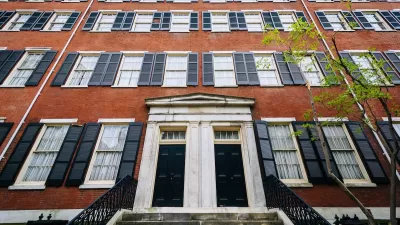Despite the popularity of Ballard Avenue’s outdoor dining pergolas, some district board members argue the patios don’t match the district’s historic character.

The popular outdoor dining patios created during the pandemic in Seattle’s Ballard Avenue Landmark District could be going away, if the district’s board has its way, reports Ray Dubicki in The Urbanist.
Despite widespread community support, some board members see the eateries as an eyesore that “defile the historic district.” One supportive board member challenged the idea that removing the patios in favor of street parking would improve the situation. “Why are we supporting cars instead of economic vitality,” Miriam Hinden asked.
Because of the historic nature of the district, board members want to require elements that would be cost-prohibitive for most business owners. Legally, because of their location on public right-of-way, the structures will always be deemed temporary by the city.
Dubicki points out that this highlights an inherent flaw in historic district guidelines: they don’t account for new concepts such as parklets or dining patios, leaving it up to board members to debate the appropriate number of pergolas on the street and what materials would fit in with the existing character of the neighborhood. Meanwhile, the street cafes “have done more than revitalize a stretch of shops and restaurants that were hard hit by pandemic shutdowns. They’ve become iconic in their own right.”
The original movement to preserve the district is based on economic revitalization, Dubicki notes. “Not a preservation movement. A revitalization movement.” The aesthetic qualities outlined in the historic district guidelines “are subjectively applied to new structures” anyway, Dubicki argues. “A lively Ballard Avenue is completely within the historic character of the district.”
FULL STORY: Ballard’s Historic District Board Looks to Blow the Roof Off Street Cafes

Alabama: Trump Terminates Settlements for Black Communities Harmed By Raw Sewage
Trump deemed the landmark civil rights agreement “illegal DEI and environmental justice policy.”

Planetizen Federal Action Tracker
A weekly monitor of how Trump’s orders and actions are impacting planners and planning in America.

The 120 Year Old Tiny Home Villages That Sheltered San Francisco’s Earthquake Refugees
More than a century ago, San Francisco mobilized to house thousands of residents displaced by the 1906 earthquake. Could their strategy offer a model for the present?

In Both Crashes and Crime, Public Transportation is Far Safer than Driving
Contrary to popular assumptions, public transportation has far lower crash and crime rates than automobile travel. For safer communities, improve and encourage transit travel.

Report: Zoning Reforms Should Complement Nashville’s Ambitious Transit Plan
Without reform, restrictive zoning codes will limit the impact of the city’s planned transit expansion and could exclude some of the residents who depend on transit the most.

Judge Orders Release of Frozen IRA, IIJA Funding
The decision is a victory for environmental groups who charged that freezing funds for critical infrastructure and disaster response programs caused “real and irreparable harm” to communities.
Urban Design for Planners 1: Software Tools
This six-course series explores essential urban design concepts using open source software and equips planners with the tools they need to participate fully in the urban design process.
Planning for Universal Design
Learn the tools for implementing Universal Design in planning regulations.
Clanton & Associates, Inc.
Jessamine County Fiscal Court
Institute for Housing and Urban Development Studies (IHS)
City of Grandview
Harvard GSD Executive Education
Toledo-Lucas County Plan Commissions
Salt Lake City
NYU Wagner Graduate School of Public Service





























